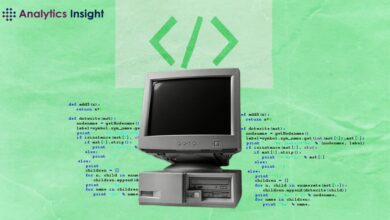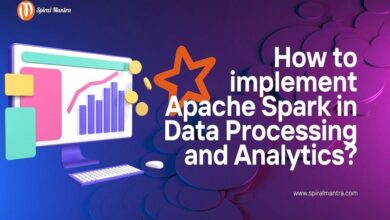BAI Roundtable Envisions the Future of Data Science and Analytics
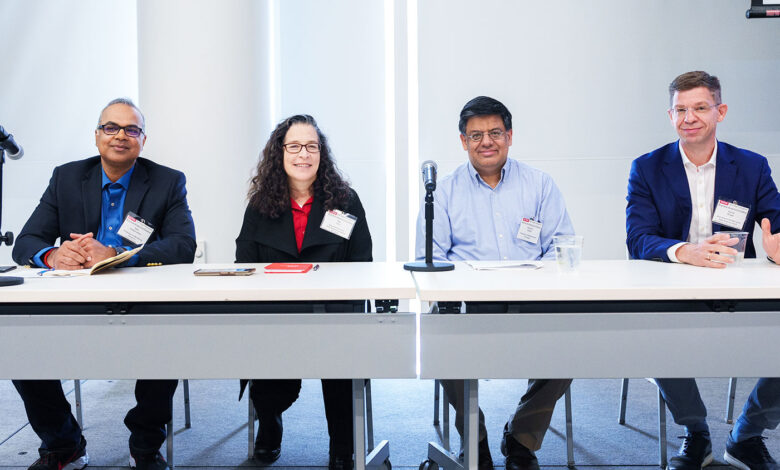
What analytics trends are changing the landscape of marketing? Which tools and techniques should students put into their analytics toolkit? How can analytics create real value for businesses? Industry experts and academics discussed these questions and more at Poole College of Management’s third annual Business Analytics Initiative (BAI) Roundtable at Hunt Library on Wednesday, April 17.
Gathering more than 100 faculty members, professionals and students, the event encouraged NC State students and alums to do what they do best: solve real problems with innovative solutions.
“We have undergraduate students, graduate students and faculty all in attendance today – and we have great interdisciplinary representation in the room,” said Kristin Siebenaler, director of the BAI, to open the event. “Together, we’ll discuss emerging trends, generate discussion and think critically about what lies ahead.”
According to Bill Rand, executive director of the BAI and McLauchlan Distinguished Professor of Marketing and Analytics, facilitating interdisciplinary dialogue through these roundtable events plays a critical role in advancing education, research and thought leadership to inform strategic decision-making in a rapidly-changing world.
Identifying Analytics Trends
Roopa Bhat, vice president of analytics at Epsilon, a global advertising and marketing technology company with Publicis Groupe, kicked off the roundtable with an industry keynote presentation discussing the latest trends in marketing analytics and the importance of staying relevant.
Sharing the example of Blockbuster’s downfall after refusing to purchase Netflix, Bhat illustrated why trends matter. “Blockbuster said no because it was ‘just a trend’ – and today, Netflix is a $266 billion company across the globe,” she said.
Bhat then discussed the integration of AI into marketing technology (MarTech), including both applied AI and generative AI, the growth of integrated MarTech clouds and the opportunities these technologies present to enhance, rather than replace, human capital. Given these opportunities, Bhat said marketers ought to focus on upskilling in order to facilitate the convergence of human and AI-driven efficiency.
Along with AI, synthetic data and real-time data will also unleash new opportunities for companies, Bhat said – such as removing algorithm bias and empowering real-time decision-making. Rapidly-evolving technology, however, also presents new challenges. These include ethics and sustainability concerns – such as data privacy and conscious consumerism – and navigating new trends with marketing channels, such as Gen Z’s increasing use of Tik Tok, rather than Google, as a search engine.
Iswarya Ravichandran, a Master of Management, Marketing Analytics (MMA) student who attended the roundtable, said the session was deeply practical and relevant – and motivated her to stay abreast of current trends to make herself more marketable. “As data scientists and analysts, you need to know the trends and get updated. Roopa gave a detailed explanation on why AI is so important and how it can be used effectively for marketing – and how to interpret real-time data to make decisions.”
Facilitating Interdisciplinary Dialogue
An academic panel discussing the interdisciplinary space between data science, AI and analytics followed the industry keynote. Moderated by Ram Janakiraman, Poole College professor of marketing analytics, the panel included Ray Levy, executive director of the Data Science Academy at NC State, Mansoor Haider, director of NC State’s master’s degree in Foundations of Data Science (MSFDS) and Daniel Ringel, assistant professor of marketing for data science and AI at Kenan-Flagler Business School at the University of North Carolina at Chapel Hill.
To navigate the ever-evolving tech landscape, the panelists encouraged students to remain committed to problem-solving and continuous learning. Rather than seeking to learn each new tool and technique, students should focus on understanding the capabilities and limitations of different platforms to select the right technologies for creating solutions to various problems. Additionally, the panelists encouraged audience members to work on improving communication with professionals from other disciplines.
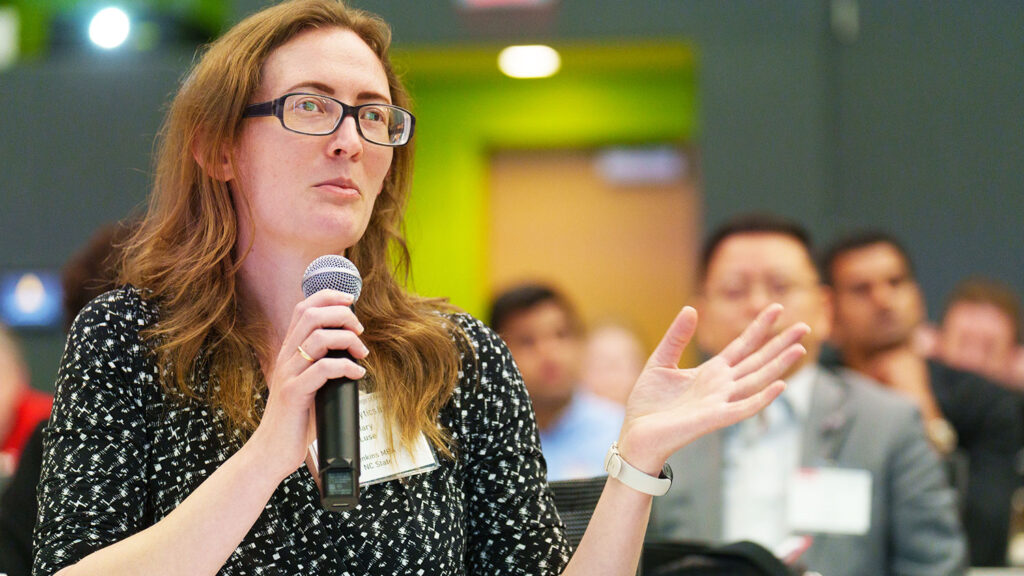
“Why isn’t everything interdisciplinary? Because we are attracted to working in a certain way. We group with like-minded individuals and use coded language. That makes us a community, which is a good thing – but all of that community norming makes it challenging to talk across disciplines,” Levy explained.
The best way to overcome these challenges? Practice, the panelists said.
“If you have three teams, bring them together to talk about a common data set and ask them what they see and what implications they get from it,” Levy said.
“Use laypeople’s terms and try to give examples they can relate to and keep practicing that,” Ringel added. “Then people can understand what you’re doing, why you’re doing it and how your ideas align with their objectives.”
Exploring Growing Opportunity
In the academic keynote presentation, Alyson Wilson, professor of statistics in Poole College of Management, associate vice chancellor for National Security and Special Research Initiatives at NC State and principal investigator for NC State’s Laboratory for Analytic Sciences, discussed the explosion of data and data science in today’s world – and the opportunities it creates for professionals.
Wilson reflected on her time in college in the 1980s and noted that she brought a typewriter, not a computer. Within four decades, however, college students began interacting with computers on a daily basis.
“In my lifetime, this has changed – and what I’m going to argue is that where we are with data right now is where we were with the computers in the 80s. When I was in college, if I wanted to use a computer, I had to go to a special place and take a special class. It was this kind of magical thing,” Wilson said.
Similarly, she said, the use of data is going to accelerate in students’ professional lifetimes. “Keep the metaphor of the computer in your brain. Computers used to be for data scientists and statisticians, but that’s not true anymore. The same thing is going to happen with data. Data science is for everyone,” she said
Although this creates an unlimited number of opportunities to create value with data, Wilson encouraged audience members to maximize their professional opportunities by identifying the part of the data lifecycle that interests them most.
“It’s very unlikely that you’re going to be equally expert in all aspects of this data lifecycle. There’s this entire cycle and there are opportunities to add value throughout the cycle. You have to think about which part of the cycle makes you light up,” she said.
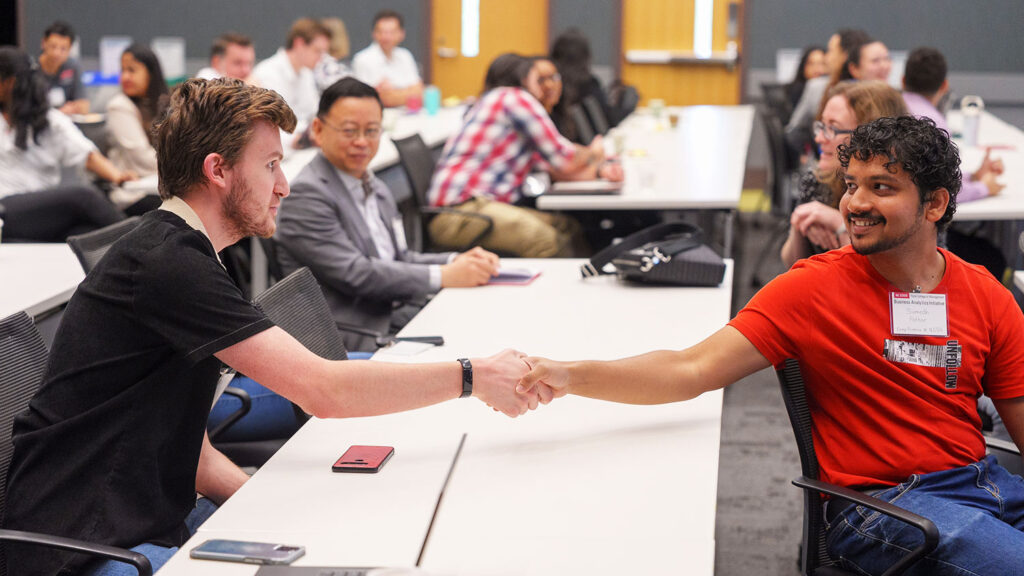
Delivering Actionable Insights
To close out the day, Wayne Thompson, professor of practice in the department of business management at Poole College, moderated an industry panel featuring three NC State alums. Panelists included Ryan Coble (MBA ‘21), data scientist at Apple, Trevor Ferree (‘20), co-founder of TSV Analytics, a startup leveraging analytics to monitor social media content and deliver insights about how conversations are trending and Nathan Paris (MMA ‘23), marketing director at Tands, Inc., which owns and operates Bojangles restaurants in Eastern North Carolina and Richmond, Virginia.
The panelists discussed emerging trends, ethics and data privacy concerns, data visualization and the importance of communicating actionable insights to stakeholders.
“We analyze millions of social media posts and try to boil those posts down into the few things marketers and social media managers should know about. How do we display that and make it as simple as possible for them to understand? They don’t like a lot of visualization and graphs – they just want to know the main things they should care about,” Ferree said.
Paris, one of the first graduates of the MMA program, added that the program gave him the skills needed to identify and deliver these kinds of actionable insights.
“I’ve been doing marketing for 30 years and I’ve gone from industry to industry. The toolbox has been mostly the same, but the one thing I was soft on was the analytics side. So I was excited when I saw this program. And I can say that it’s made my job more fun,” Paris said. “My analytical skills have helped me generate a culture where analytics are seen as a good thing that helps us make decisions. For example, I was talking to someone earlier about how restaurants do pricing. They often drive around to different restaurants and compare all the different prices on the menu – and it can take weeks. But with predictive modeling, it can take minutes.”
We consider ourselves to be the Think and Do business school, and our Business Analytics Initiative is the embodiment of that.
The alumni reflections not only provided examples of analytics in action, but also served as a reminder of Poole College’s commitment to empower today and tomorrow’s business leaders with practical skills and hands-on learning opportunities.
“We consider ourselves to be the Think and Do business school and our Business Analytics Initiative is the embodiment of that,” said Richard Warr, associate dean for faculty and research and professor of finance at Poole College of Management. “We’re dedicated to preparing the next generation of business leaders and embed analytics into all majors so they can tackle real-world problems and present solutions.”
